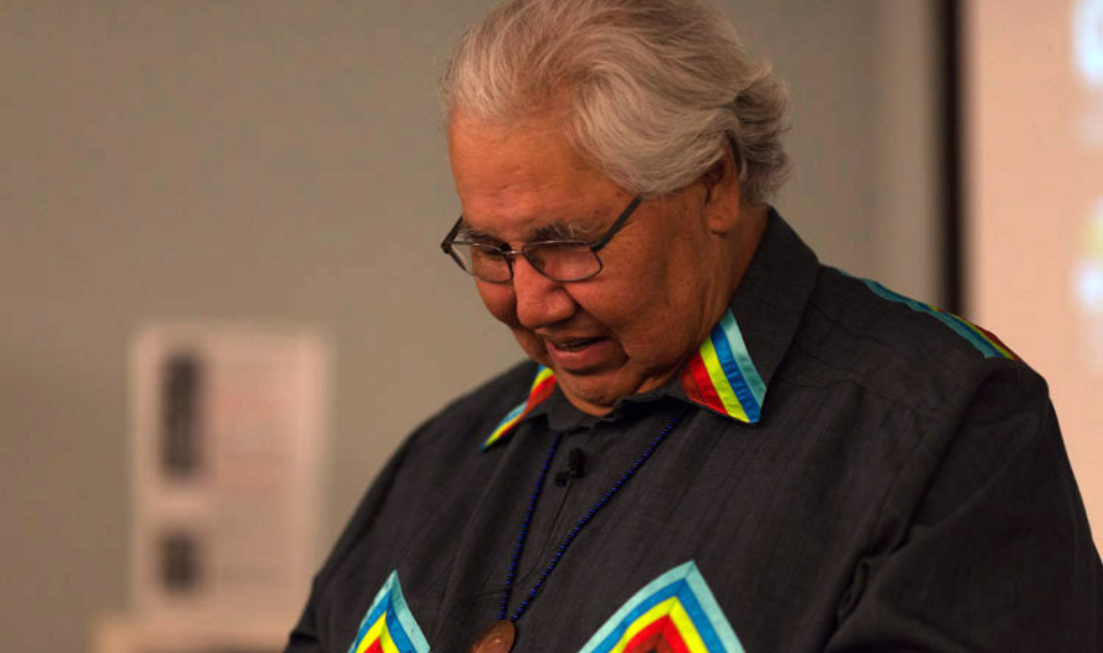‘His position was that education would pave the way to reconciliation’: In memory of Murray Sinclair

Senator Murray Sinclair addresses residential school Survivors at the Shingwauk 2015 Gathering. (Image by Archkris, CC BY-SA 4.0, via Wikimedia Commons)
The McMaster community joins in mourning Senator Murray Sinclair, an extraordinary leader, a powerful advocate for human rights and a champion of truth and justice for Indigenous peoples.
An Anishinaabe senator, Manitoba’s first Indigenous judge, and a companion of the Order of Canada who led the Truth and Reconciliation Commission (TRC), Sinclair spoke for voices that had long been silenced, empowered other Indigenous people to speak, and made sure their stories were heard.
“His impact across our country and at our university cannot be overstated,” says McMaster President David Farrar. “The TRC’s calls to action created the roadmap that guides Canadians and McMaster in our ongoing journey toward Truth and Reconciliation. Senator Sinclair’s work taught us to listen to the stories and experiences of Indigenous peoples, and underscored the critical role of education in addressing the terrible injustices experienced by Indigenous communities.”
Bernice Downey, Associate Dean, Indigenous Health, shares her personal reflection on Senator Sinclair.
Mazina Giizhik (the One Who Speaks of Pictures in the Sky) The Honourable Murray Sinclair: The man, the wisdom keeper, the speaker of truth
As tributes and condolences pour in across the country with the passing of the Honourable Murray Sinclair on November 4, 2024, I recall the few personal interactions that I have had with him. I first met him when I was leading an Indigenous health organization. I was invited by a colleague to travel to Winnipeg to consult with him about Indigenous policing and health partnerships. I looked forward to the meeting because I had heard of him in a professional capacity, but his last name was also a family name of my own and I wondered about potential connections.
Murray suggested a local venue where he promised the delight of local, fresh pickerel and the ‘best coconut cream pie in the city’. I had been briefed by my colleague about Murray’s accomplishments and his reputation as a leader, a lawyer and a judge. But, as we sat enjoying a meal together, sharing stories about our families and our work, I had the memorable experience of coming to know the man. The relationship building over a shared meal is always a testament to Indigenous values of connection and reciprocity.
He asked about my people and shared some local history that helped me understand how Indigenous families had become disconnected. His kind and gentle manner in conveying this truth, contributed to my personal healing journey in a subtle but powerful way. Words that stayed with me and rippled into my consciousness many times over the years.
The second time we crossed paths was at a lecture he provided to a regional crowd here in Ontario. The Truth and Reconciliation Commission of Canada’s Final Report was released that year and the societal ‘awakening’ for both Indigenous and non-Indigenous people was evident in the professional, academic and community circles that I run in.
He sat on the stage in an armchair discussion with a presence that conveyed both humility and wisdom. During the question period that followed, a young Indigenous woman conveyed how individuals like herself, working in Indigenous non-profit organizations with limited resources and capacity were quickly becoming overwhelmed with the challenge to respond to the rapidly increasing requests from non-Indigenous organizations and government to collaborate in reconciliation–oriented endeavours. She became tearful as she spoke.
His response pulled me back to our conversation in Winnipeg because his response was conveyed with kindness and an acknowledgement of the audience member’s personal struggle. With a firm directive, he reminded the audience that it is not Indigenous people alone who are going to take us to where we need to go in a shared reconciliation process. There are just not enough of us to accomplish such a feat. Rather, it is the collaboration with our non-Indigenous allies that hold potential to truly create positive change. His voice held such clarity and conviction and reverberated through the audience with an after-effect of reassurance and guidance in my own work.
Here in the Faculty of Health Sciences, the emerging network of non-Indigenous allies is an integral element of progress made in our shared goal of responding to the TRC’s Calls to Action. We are faced with the challenge of articulating colonizing truths, and then working through the arduous tasks of un-ravelling and de-colonizing the many layers of the academic and administrative process.
The journey of the past seven years has included discussions defined with the sharp edges of truths articulated by many Indigenous scholars, practitioners, learners and community members. From the beginning of this journey, we have called on our non-Indigenous allies, shared meals and stories together and over time, fostered our relationships.
The truth is that from time to time, I still experience what I describe as ‘colonial moments’ in my work; when another systemic truth is emerging that must be spoken about. It is in those moments, often accompanied by inner turmoil and isolation that I try to channel Murray Sinclair’s spirit and words. His position was that ‘education would pave the way’ to reconciliation and he called on us directly with this truth.
I now see these episodes of colonial moments as a signal that a potential for positive change is growing. It is through our collective approach with our Indigenous allies walking alongside that will shape the path forward. It is with our own courage, conviction and clarity that we will continue to the lead the way.
Kichi Miigwetch Mazina Giizhik, for your work, your spirit, your wisdom and your gentle ways.
McMaster’s flags will be lowered to half-mast on Sunday, November 10 in honour of Sinclair. Learn more here.


